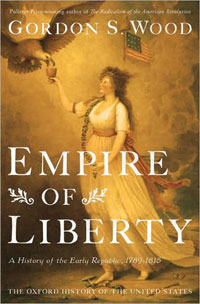Good Wood on U.S. History

Pulitzer-winning Brown University history mentor emeritus (The Radicalism of the American Revolution, The Creation of the American Republic, 1776-1787) Gordon Wood has a lucid and elucidating take on history’s popularizers—like David McCullough, Walter Isaackson, Jon Meacheam, Stephen Ambrose—pointing out that it is not quality of prose that discourages readers from plumbing the waters of academic scholarship, but usually the narrow choice of subject matter. He concludes:
…the academics have generally left narrative history writing to the non-academic historians, who unfortunately often write without much concern for or much knowledge of the extensive scholarship that exists. If academic historians want popular narrative history that is solidly based on the monographic literature, then they will have to write it themselves.
Well, Wood, as the hipoisie says, talks the talk and walks the walk. His new opus, which is part of Oxford University Press’s Oxford History of the United States series (currently numbering 13 volumes, which they proudly point out includes three Pulitzer Prize winners), Empire of Liberty: A History of the Early Republic, 1789-1815, picks up where his Creation volume left off. In the quarter-century he scrutinizes, a time of tempestuous transformation, Wood points out that the young nation changed in ways the founders did not anticipate—shifting from a young republic to a country with imperial/expansionist aspirations (y’all remember the Louisiana Purchase, don’t ya?). Wood asserts:
By the end of that second war against the British in 1815 the central impulses of the Revolution had run their course. Americans believed that their Republic was at last secure and independent, free from hostile merchantile empires and the ravages of the European wars that had tormented them for over two decades…With nearly an entire continent at their disposal, they believed that they were at last ready to exploit the great possibilities that lay before them. At the same time, however, many of them had come to realize thazt their future as a united and freedom3 loving people was being thwarted by the continuing presence of slavery in their midst. The grand experiment in republicanism was not over after all and would have to be further tested.
